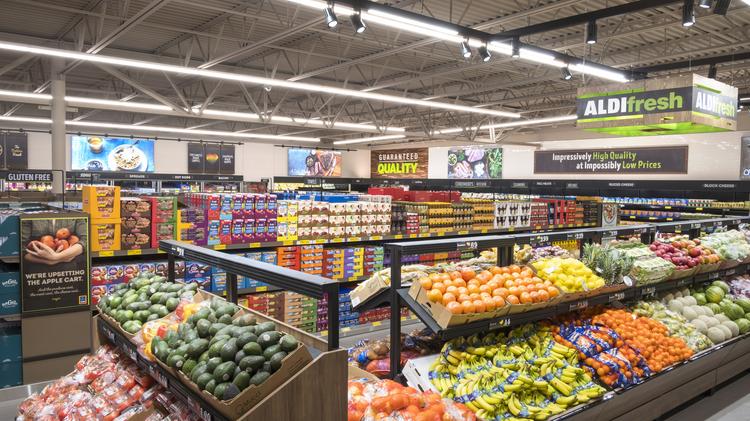Whole Foods scales back and Aldi rolls
out $1B in improvements
Feb 10, 2017, 2:55pm
EST Updated Feb 10, 2017, 3:05pm EST
Ashley Gurbal
KritzerSenior ReporterTampa Bay Business Journal
Grocers across
the gamut are trying to strike the right balance of upscale touches and
competitive pricing — as recent moves by Aldi Inc. and Whole Foods Market Inc. demonstrate.
Austin-based Whole Foods (NASDAQ: WFM) said on Wednesday it
would close nine stores and shift its focus to 365 by Whole Foods, a
millennial-driven discount concept that's smaller than its traditional stores.
Florida, with 26 Whole Foods stores including two in Tampa, was spared from the
closures.
 The produce department
Aldi. The German discount grocer is expanding produce departments… more
The produce department
Aldi. The German discount grocer is expanding produce departments… more
German discount grocer Aldi Inc. said this week that it is
investing $1.6 billion in its U.S. growth, with plans to remodel and expand
1,300 stores by 2020. Some of that is already underway; in January, the company
pulled a building permit for a $117,000 remodel of its store at 620 E. Brandon
Blvd. in Brandon.
Whole Foods CEO John Mackey said on a call with investors
that Whole Foods has seen sales decline as traditional supermarkets have
expanded their organic and natural selections.
"I do think the world is very different today than it was
five years ago," Mackey said on the call.
That's due in large part to strategies employed by
Lakeland-based Publix Super Markets Inc. and one of its
biggest competitors, Kroger Co. (NYSE: KR).
Publix and Kroger are mainstream grocers that are trying to
appeal to a wider customer base than ever before, as new grocery concepts, meal
kits and increasing food delivery options eat up share from traditional
grocers.
That means they now cater to craft beer
enthusiasts and have larger wine and specialty cheese departments. They have
more flattering lighting and sophisticated signage — all while trying to remain
price conscious.
Aldi, a place where customers have to bag their own groceries
and put down a 25-cent deposit on a shopping cart, is moving in the same
direction. Its $1 billion-plus improvements will make way for more fresh items
and in some cases, a more modern design with "open ceilings, natural
lighting and environmentally friendly building materials – such as recycled
materials, energy-saving refrigeration and LED lighting," according to the
company.
Whole Foods is
attempting to strike the same balance with its 365 by Whole Foods stores. That
concept features upscale touches like a coffee bar with a customizable tea
machine and a fresh cut fruit bar, but also emphasizes the grocer's private
label goods, a discount compared to most name-brand items.
Kroger has made substantial investments in reaching more upscale
customers. It is backing Lucky's Market, an organic grocer that's planning up
to 10 locations in Tampa Bay. Kroger is likely to gain insight on how to better
reach that category of shoppers from its deal with Lucky's.
It also recently acquired
Murray's Cheese, a New York-based specialty cheese company.
But it isn't enough for a grocer to just offer a beautiful store
and specialty items, as the problems plaguing Whole Foods show. Pricing is also
an issue — even for Publix, which isn't known as a discount grocer.
Slashing prices doesn't fit the Publix image of a store
"where shopping is a pleasure," but the grocer does like to tout its
buy one, get one free deals and competitive pricing, especially as it relates
to Walmart Stores Inc., which is just behind Publix in market share in Central
Florida.
It's a strategy that will continue to evolve in the coming
years, especially as Sprouts Farmers Market Inc. (NASDAQ: SFM) starts to open
its first wave of Florida stores. Sprouts, which is known for low prices on
organic produce, will open its first
Florida store in Tampa later this month.
No comments:
Post a Comment